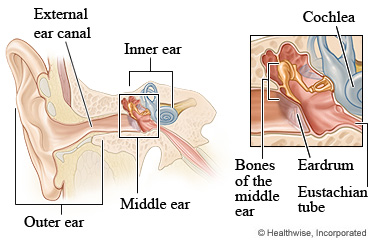
What is tympanoplasty?
Tympanoplasty (say "tim-PAN-oh-plass-tee") is surgery to repair a hole in the eardrum. It may be done to improve hearing or to stop frequent ear infections that did not get better with other treatments.
Your child will get medicine to fall asleep or feel relaxed during the surgery. The surgery is usually done through the opening of the ear canal. Sometimes the surgery is done through a cut (incision) behind the ear. The doctor may use a small piece of tissue taken from behind your child's ear to patch the hole in the eardrum. Or the doctor may use an artificial graft to patch the hole. If your child had an incision behind the ear, the doctor will close it with stitches.
Your child will probably go home from the hospital on the same day of the surgery. Most children are able to go back to school or their normal routine in about 1 to 2 days. But they should not play hard or do things like sports for about 3 weeks.
How do you prepare for surgery?
Surgery can be stressful for both your child and you. This information will help you understand what you can expect. And it will help you safely prepare for your child's surgery.
 Preparing for surgery
Preparing for surgery
- Talk to your child about the surgery. Tell your child that surgery will help the ear problem. Hospitals know how to take care of children. The staff will do all they can to make it easier for your child.
- Ask if a special tour of the surgery area and hospital is available. This may make your child feel less nervous about what happens.
- Plan for your child's recovery time. Your child may need more of your time right after the surgery, both for care and for comfort.
- Understand exactly what surgery is planned, along with the risks, benefits, and other options.
- Tell the doctor ALL the medicines, vitamins, supplements, and herbal remedies your child takes. Some may increase the risk of problems during the surgery. Your doctor will tell you if your child should stop taking any of them before the surgery and how soon to do it.
The day before surgery
- A nurse may call you (or you may need to call the hospital). This is to confirm the time and date of your child's surgery and answer any questions.
- Remember to follow your doctor's instructions about your child taking or stopping medicines before surgery. This includes over-the-counter medicines.
What happens on the day of surgery?
-
Follow the instructions exactly about when your child should stop eating and drinking. If you don't, the surgery may be canceled. If the doctor told you to have your child take any medicines on the day of surgery, have your child take them with only a sip of water.
-
Have your child take a bath or shower before you come in. Do not apply lotion or deodorant.
-
Your child may brush their teeth. But tell your child not to swallow any toothpaste or water.
-
Do not let your child wear contact lenses. Bring your child's glasses or contact lens case.
-
Be sure your child has something that reminds them of home. A special stuffed animal, toy, or blanket may be comforting. For an older child, it might be a book or music.
At the hospital or surgery center
- A parent or legal guardian must accompany your child.
- Your child will be kept comfortable and safe by the anesthesia provider. The anesthesia may make your child sleep. Or it may just numb the area being worked on.
- The surgery will take about 1 to 3 hours.
- After surgery, your child will be taken to the recovery room. As your child wakes up, the recovery room staff will monitor your child's condition. The doctor will talk to you about the surgery.
- You will probably be able to take your child home the day of the surgery.
- Your child will have foam packing or ointment in the ear canal. Your doctor may take this out about 1 to 2 weeks after the surgery.
- Your child may have strips of tape or a bandage over the incision behind the ear.
When should you call your doctor?
- You have questions or concerns.
- You don't understand how to prepare your child for the surgery.
- Your child becomes ill before the surgery (such as fever, flu, or a cold).
- You need to reschedule or have changed your mind about your child having the surgery.
Where can you learn more?
Go to http://www.healthwise.net/patientEd
Enter Q836 in the search box to learn more about "Tympanoplasty: Before Your Child's Surgery".
Current as of: October 27, 2024
Author: Ignite Healthwise, LLC Staff
Clinical Review Board
All Ignite Healthwise, LLC education is reviewed by a team that includes physicians, nurses, advanced practitioners, registered dieticians, and other healthcare professionals.

